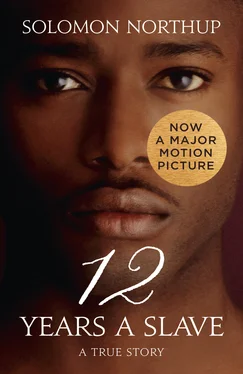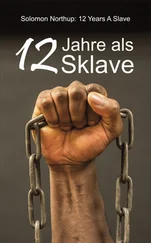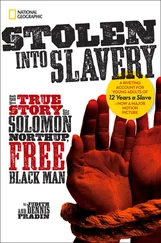1 ...7 8 9 11 12 13 ...16 “Well, boy, where did you come from?”
Forgetting myself, for a moment, I answered, “From New York.”
“New York! H—l! What have you been doing up there?” was his astonished interrogatory.
Observing Burch at this moment looking at me with an angry expression that conveyed a meaning it was not difficult to understand, I immediately said, “O, I have only been up that way a piece,” in a manner intended to imply that although I might have been as far as New York, yet I wished it distinctly understood that I did not belong to that free state, nor to any other.
Goodin then turned to Clem, and then to Eliza and the children, examining them severally, and asking various questions. He was pleased with Emily, as was everyone who saw the child’s sweet countenance. She was not as tidy as when I first beheld her; her hair was now somewhat disheveled; but through its unkempt and soft profusion there still beamed a little face of most surpassing loveliness. “Altogether we were a fair lot—a devilish good lot,” he said, enforcing that opinion with more than one emphatic adjective not found in the Christian vocabulary. Thereupon we passed into the yard. Quite a number of slaves, as many as thirty I should say, were moving about, or sitting on benches under the shed. They were all cleanly dressed—the men with hats, the women with handkerchiefs tied about their heads.
Burch and Goodin, after separating from us, walked up the steps at the back part of the main building, and sat down upon the door sill. They entered into conversation, but the subject of it I could not hear. Presently Burch came down into the yard, unfettered me, and led me into one of the small houses.
“You told that man you came from New York,” said he.
I replied, “I told him I had been up as far as New York, to be sure, but did not tell him I belonged there, nor that I was a freeman. I meant no harm at all, Master Burch. I would not have said it had I thought.”
He looked at me a moment as if he was ready to devour me, then turning round went out. In a few minutes he returned. “If ever I hear you say a word about New York, or about your freedom, I will be the death of you—I will kill you; you may rely on that,” he ejaculated fiercely.
I doubt not he understood then better than I did the danger and the penalty of selling a free man into slavery. He felt the necessity of closing my mouth against the crime he knew he was committing. Of course, my life would not have weighed a feather, in any emergency requiring such a sacrifice. Undoubtedly, he meant precisely what he said.
Under the shed on one side of the yard, there was constructed a rough table, while overhead were sleeping lofts—the same as in the pen at Washington. After partaking at this table of our supper of pork and bread, I was handcuffed to a large yellow man, quite stout and fleshy, with a countenance expressive of the utmost melancholy. He was a man of intelligence and information. Chained together, it was not long before we became acquainted with each other’s history. His name was Robert. Like myself, he had been born free, and had a wife and two children in Cincinnati. He said he had come south with two men, who had hired him in the city of his residence. Without free papers, he had been seized at Fredericksburgh, placed in confinement, and beaten until he had learned, as I had, the necessity and the policy of silence. He had been in Goodin’s pen about three weeks. To this man I became much attached. We could sympathize with, and understand each other. It was with tears and a heavy heart, not many days subsequently, that I saw him die, and looked for the last time upon his lifeless form!
Robert and myself, with Clem, Eliza and her children, slept that night upon our blankets, in one of the small houses in the yard. There were four others, all from the same plantation, who had been sold, and were now on their way south, who also occupied it with us. David and his wife, Caroline, both mulattoes, were exceedingly affected. They dreaded the thought of being put into the cane and cotton fields; but their greatest source of anxiety was the apprehension of being separated. Mary, a tall, lithe girl, of a most jetty black, was listless and apparently indifferent. Like many of the class, she scarcely knew there was such a word as freedom. Brought up in the ignorance of a brute, she possessed but little more than a brute’s intelligence. She was one of those, and there are very many, who fear nothing but their master’s lash, and know no further duty than to obey his voice. The other was Lethe. She was of an entirely different character. She had long, straight hair, and bore more the appearance of an Indian than a negro woman. She had sharp and spiteful eyes, and continually gave utterance to the language of hatred and revenge. Her husband had been sold. She knew not where she was. An exchange of masters, she was sure, could not be for the worse. She cared not whither they might carry her. Pointing to the scars upon her face, the desperate creature wished that she might see the day when she could wipe them off in some man’s blood!
While we were thus learning the history of each other’s wretchedness, Eliza was seated in a corner by herself, singing hymns and praying for her children. Wearied from the loss of so much sleep, I could no longer bear up against the advances of that “sweet restorer,” and laying down by the side of Robert, on the floor, soon forgot my troubles, and slept until the dawn of day.
In the morning, having swept the yard, and washed ourselves, under Goodin’s superintendence, we were ordered to roll up our blankets, and make ready for the continuance of our journey. Clem Ray was informed that he would go no further, Burch, for some cause, having concluded to carry him back to Washington. He was much rejoiced. Shaking hands, we parted in the slave pen at Richmond, and I have not seen him since. But, much to my surprise, since my return, I learned that he had escaped from bondage, and on his way to the free soil of Canada, lodged one night at the house of my brother-in-law in Saratoga, informing my family of the place and the condition in which he left me.
In the afternoon we were drawn up, two abreast, Robert and myself in advance, and in this order, driven by Burch and Goodin from the yard, through the streets of Richmond to the brig Orleans . She was a vessel of respectable size, full rigged, and freighted principally with tobacco. We were all on board by five o’clock. Burch brought us each a tin cup and a spoon. There were forty of us in the brig, being all, except Clem, that were in the pen.
With a small pocket knife that had not been taken from me, I began cutting the initials of my name upon the tin cup. The others immediately flocked round me, requesting me to mark theirs in a similar manner. In time, I gratified them all, of which they did not appear to be forgetful.
We were all stowed away in the hold at night, and the hatch barred down. We laid on boxes, or wherever there was room enough to stretch our blankets on the floor.
Burch accompanied us no farther than Richmond, returning from that point to the capital with Clem. Not until the lapse of almost twelve years, to wit, in January last, in the Washington police office, did I set my eyes upon his face again.
James H. Burch was a slave trader—buying men, women and children at low prices, and selling them at an advance. He was a speculator in human flesh—a disreputable calling—and so considered at the South. For the present he disappears from the scenes recorded in this narrative, but he will appear again before its close, not in the character of a man-whipping tyrant, but as an arrested, cringing criminal in a court of law, that failed to do him justice.
After we were all on board, the brig Orleans proceeded down James River. Passing into Chesapeake Bay, we arrived next day opposite the city of Norfolk. While lying at anchor, a lighter approached us from the town, bringing four more slaves. Frederick, a boy of eighteen, had been born a slave, as also had Henry, who was some years older. They had both been house servants in the city. Maria was a rather genteel looking colored girl, with a faultless form, but ignorant and extremely vain. The idea of going to New Orleans was pleasing to her. She entertained an extravagantly high opinion of her own attractions. Assuming a haughty mien, she declared to her companions, that immediately on our arrival in New Orleans, she had no doubt, some wealthy single gentleman of good taste would purchase her at once!
Читать дальше












